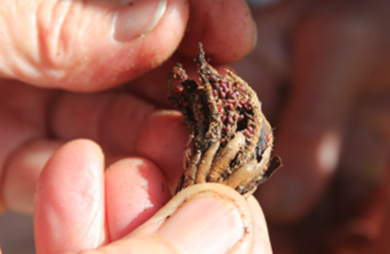Date: 21 May 2018
Dactylanthus, commonly known as wood rose, is a highly unusual plant and holds a special place in New Zealand's indigenous flora as the only fully parasitic flowering plant.
It grows as a root-like stem attached to the root of a host tree and it is through this placenta-like attachment that dactylanthus draws all its nutrients. This plant has never been considered common and occurs in widely scattered sites across the North Island. Currently, there are likely to be only a few thousand remaining.
The translocation of the seed is part of the Trust’s native forest restoration plan, which includes reintroducing and protecting threatened species over 500 hectares.

Dactylanthus seed head
Image: DOC
James Denyer of AFP who helped organise and attended the event said, “The Trust enjoyed a fabulous day in Aongatete Forest alongside DOC, learning hands-on about dactylanthus and how to plant the seeds.”
Although it could take many years to see the signs of the plants emergence, the Trust will be monitoring the seed sowing sites with the hope that the population will become locally abundant and self-sustaining in the long term.
DOC Biodiversity Ranger Paul Cashmore who is involved in the District’s flora programmes said, “We will have to wait many years to see if this project has been successful, but it is the first reintroduction of this threatened species into the Kaimai-Mamaku Conservation Park where it is highly likely to have been present historically. It’s great that this work can be done with the ongoing support of the Trust and iwi.”
At the end of the day, everyone marched out of the forest feeling grateful for the opportunity and acknowledging the success of the team effort.
“We are profoundly thankful for all the support we have received from DOC with this project, and we also acknowledge the support of tangata whenua from Ngai Tamawhariua" says James Denyer.
This project would not have been possible without the support of Tauranga City Council, whose land the seed was sourced from, and its ongoing endorsement of the recovery plan.
DOC also acknowledges the Trust for its support with pest control within the forest. Controlling possum numbers and other browsing animals like deer and pigs helps the long-term protection of the plant by maintaining overall health of the forest ecosystem. Without the Trust’s ongoing pest control operations, this project could not have been undertaken.
Find out more about Aongatete Forest Project
Contact
Tracy Mezger, Community Ranger
Mobile: +64 027 536 6839
Email: tmezger@doc.govt.nz





修改评论